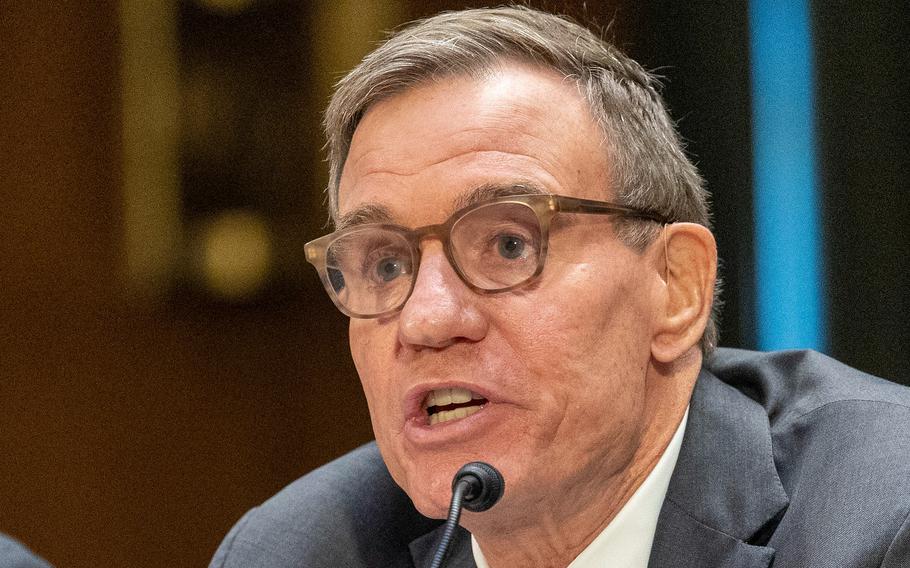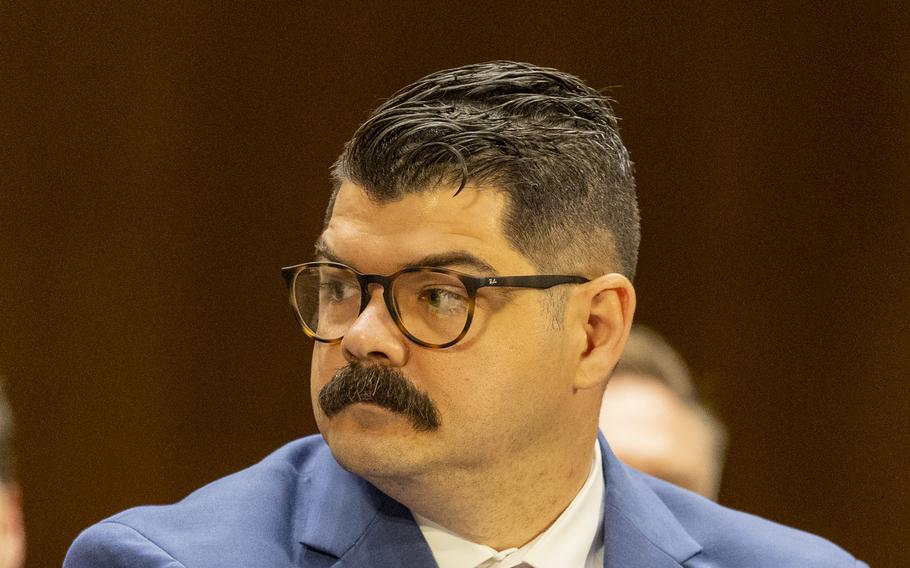
Sen. Mark Warner, D-Va., speaks Tuesday, April 29, 2025, during a Senate Veterans’ Affairs Committee hearing to discuss enhancing outreach to support mental health programs for veterans. (Eric Kayne/Stars and Stripes)
WASHINGTON — Funding suicide prevention efforts at local agencies that are close to where veterans live was prioritized by senators as they considered reauthorizing — and possibly expanding — a $174 million grant initiative that pays for community-based outreach services, mental health screenings and emergency clinical services.
Republican and Democratic senators at a hearing Tuesday of the Senate Veterans’ Affairs Committee expressed unanimous support for renewing the Staff Sergeant Parker Gordon Fox Suicide Prevention Services Grant Program through the Department of Veterans Affairs. The hearing was to collect testimony about the performance of the 3-year-old grants initiative.
The program also funds peer support, family education and social workers to link veterans to resources and services in their communities.
“Veteran suicide is a scourge that has to be addressed,” said Sen. Mark Warner, D-Va., who is helping to lead the legislation for renewing and expanding the grant program in fiscal 2025 for another three years. “The Staff Sergeant Fox Grant Program has played an invaluable role getting organizations already doing life-saving mental health outreach more support.”
But Democratic senators also sought reassurance from the VA that contract cuts and workforce reductions ordered by President Donald Trump will not affect the delivery of community-based services for veterans at risk of suicide.
Sen. Richard Blumenthal of Connecticut, the top Democrat on the committee, said more than 17 veterans on average take their lives by suicide each day. But data shows 10 of those veterans on average never connected with the VA for help.
“Outreach takes humans. It can’t be done by an automated message machine,” he said.
Thomas O’Toole, deputy undersecretary for health at the VA, said staff levels at the veterans 24-hour crisis line are higher now than a year ago, though some workers were initially cut and then rehired when Trump fired probationary workers at federal agencies in February.
But Sen. Elissa Slotkin, D-Mich., said she does not understand how the VA can expect to maintain or enhance mental health care for at-risk veterans as it prepares to lay off 83,000 workers in the summer.
She referred to the VA plan to reduce its workforce to 2019 levels as it reorganizes the agency, according to a memo from VA Chief of Staff Christopher Syrek.
“We have an obligation in this country not to compromise veterans care,” Slotkin said. “I’m not seeing how the math is going to work out.”
Steffen Crow, a retired gunnery sergeant with the Marine Corps, told senators that he has not heard any complaints from veterans about impact to community services following sweeping cuts to VA contracts earlier this year. The cuts targeted nonessential services.
Crow, a program manager with Oklahoma Veterans United, was on a six-member panel of veterans who testified in support of the suicide prevention program.

Marine Corps veteran Steffen Crow of the nonprofit Oklahoma Veterans United testifies Tuesday, April 29, 2025, before the Senate Veterans’ Affairs Committee to discuss a suicide prevention program for veterans. (Eric Kayne/Stars and Stripes)
He said, as a result of the federal grant program, his nonprofit agency has connected more than 5,000 veterans with community-based suicide prevention services. The agency also has done a major outreach with tribal veterans on Oklahoma reservations.
The grant program is named after veteran Parker Gordon Fox, a former instructor at the Army Infantry School at Fort Benning, Ga., who died by suicide in 2020 at the age of 25.
Lindsay Church, the executive director of the Minority Veterans of America, said the nonprofit that advocates for LGBTQ veterans does have concerns about the future of services provided at VA hospitals and clinics in an era of federal workforce and program cuts.
She warned there is a “growing distance between service [delivery at the VA] and the survival of veterans” at risk of suicide.
“Most of us are worried about the future of an agency that provides most of our health care,” Church said.